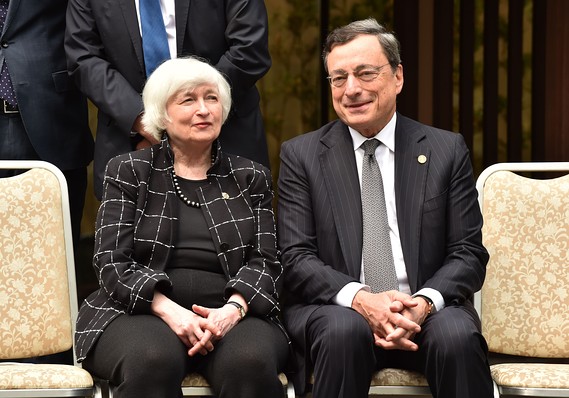 Getty Images
Getty Images
European Central Bank President Mario Draghi is worried. So is Federal Reserve Governor Lael Brainard, as well as former Federal Reserve Chairwoman Janet Yellen.
The independence of the Fed is being questioned after months of attacks by President Donald Trump on Federal Reserve Chairman Jerome Powell and the central bank’s interest-rate policy, as well as the White House’s announced plans to nominate two political allies with little economics training, Stephen Moore and Herman Cain, to the central bank.
In Washington, Draghi said he was worried about central bank independence in other countries, especially “in the most important jurisdiction in the world.”
See: Backlash against too-powerful-for-their-own-good central banks could undermine independence
Brainard said the central bank favors “fact-based intellectually coherent arguments that are based on evidence, that are consistent over time,” words intended to draw focus on Moore’s and Cain’s switch from favoring higher interest rates when unemployment was high, to now calling for lower interest rates with unemployment low. Monetary policy traditionally suggests low rates with high unemployment, and vice versa.
Yellen on Tuesday said it would be “damaging” to see the Fed politicized and pointed out that the president has the ability to influence the public about institutions.
The remarks from Draghi, Brainard and Yellen aren’t terribly different from what one hears from Wall Street economists. Yet for all the stated concern, it’s not easy to find signs financial market participants are pricing in the threat of reduced independence.
Inflation expectations, as derived from 5-year Treasury- TMUBMUSD05Y, +0.93% and inflation-protected securities, stood at 2%, which is right at the Fed’s target and lower than the 2.3% rate it was at during the autumn.
If the market were really frightened that inflation was about to get out of hand because of political lackeys on the Fed board, it would logically follow that expectations of inflation would increase.
Another casualty of a less politically independent Fed would, in theory, be the dollar DXY, +0.02% and yet, over six months, the U.S. dollar has appreciated by 2%. One would think that a Fed more intent on looser policy would result in a weaker dollar.
But Robin Brooks, chief economist at the Institute of International Finance, says the recent strength of the dollar versus emerging-market countries is a puzzle since the Fed has engineered a very well publicized about-face, both on the need for further rate hikes and on bond buying. In a tweet, he said the feedback he has received indicates that the weakness in emerging-market currencies is a sign that investor confidence in the Fed has taken a hit.
That leads to an obvious follow-up — how is the dollar rising a sign of a loss of confidence at the Fed?
In an email, Brooks pointed out that as risks rise, emerging market currencies feel the brunt.
“So in this case some market participants see the political pressure on the Fed as part of a larger destabilization, which makes it harder for EMs that rely on dollar funding and therefore need stability in global markets,” he said.
Another sign, perhaps, of deteriorating confidence in the Fed is a rising risk premium — the difference in the yield on the 30- TMUBMUSD30Y, +0.61% and the 10-year Treasury TMUBMUSD10Y, +0.99% securities is growing, rising to a nearly 18-month high.
Again, though, the signs are scattered. Not everyone is convinced that a noisy Trump, as well as underlings like National Economic Council Director Larry Kudlow, will make a lasting impact on Fed policy.
“Admittedly, President Trump is much more public and obvious about seeking to bend the Fed to the White House’s will, but he is far from the first to do so and unlikely to be last,” said Steven Blitz, chief U.S. economist at TS Lombard. “Noises aside, this Fed will do what it believes is right, regardless of the praise, brickbats, or nominees that may come its way.”








